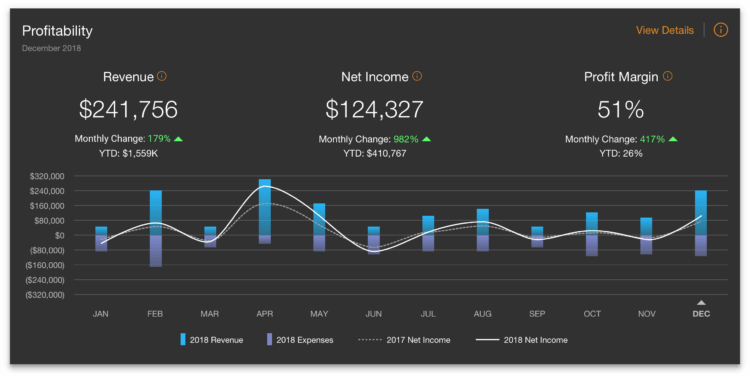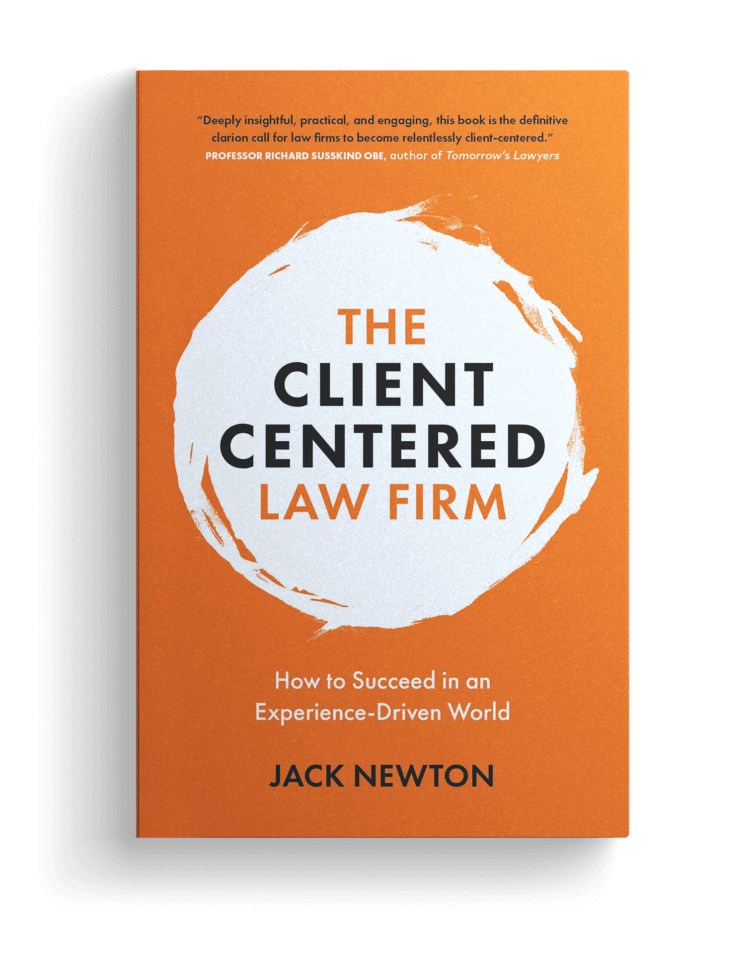Law firm profitability has always been essential to your legal practice’s success. But now, increasing your law firm’s profits is now more important than ever. A more profitable law firm has the resources to better serve clients, ensure partners and staff are compensated, and attract high-level employees.
In this post, we’ll provide tips for ways to improve your law firm’s operations, increase revenues, and make more for what you bill. This way, you can learn how to grow your law firm profits and be more successful now and in the future.
How do law firms make a profit?
Maintaining healthy law firm profitability requires effort, but the concept is straightforward: Law firms make a profit when they make more than they spend on overhead costs.
Revenue vs. profitability

We focus a lot on revenue, which is essential for your law firm’s success. But revenue alone is not the same as law firm profitability. Boosting law firm revenues helps, but you need to increase your firm’s net profits to be successful in the long term.
If you’re increasing revenue without increasing profitability, you’re leaving money on the table. For example, if your revenues go up because you’re serving more clients, but the overhead and administrative costs of serving each client are high, that undercuts your profit margin. To maximize law firm profitability, firms need to balance maximizing revenues with minimizing costs.
What can a law firm do to stay profitable?
To help your law firm become or stay profitable, look critically at whether there’s a healthy return on investment (ROI) on all of your efforts. Then, adjust if necessary. This means ensuring you’re following best practices when it comes to your law firm’s processes and tracking those efforts. These firm processes include your firm’s operational, billing, and collection rate efficiency. In addition, take a look at your law firm’s goals and stay focused on them.
Learn more about improving your firm’s ROI, collections, billing, and setting law firm goals.
Consider the following 10 tips to improve your law firm operations, make more for what you bill, and be as profitable as possible.
1. Fire yourself from jobs you shouldn’t be doing
You have a limited amount of time and energy each day. To boost your law firm’s profitability, you need to focus your time, energy, and attention on billable work—and outsource the rest.
Unless it’s a task that you really enjoy and only you can do, or there’s something that’s non-billable but leads to more profits, you need to let it go. Learning to delegate allows you to work to your full capacity. This might mean leveraging technology and handing off work to non-lawyer staff like paralegals within your firm. You could even outsource legal services to other local lawyers or freelance lawyers.
When everyone at your firm is focused on their highest-value work, you maximize revenues while reducing overhead costs. This makes a great recipe for law firm profitability.
You may like these posts
2. Use legal technology

If your focus is on boosting profitability, using tools and legal technology can help your law firm be more efficient. At the same time, technology helps with keeping costs low and freeing up your time to work on billable matters (to bring in more revenue).
Using legal technology increases law firm revenue by helping firms run more efficiently, streamlining processes, and making it easier to bill and collect on invoices.
Let the statistics speak for themselves
As the 2022 Legal Trends Report shows, law firms using technology brought in more revenue.
Firms using cloud-based LPM software were 11% more likely (63% compared to 52%) to have strong revenue streams.
Not only do these firms enjoy the profits of a successful business, but they also have more resources to continue investing in new capabilities and adaptations, furthering their competitiveness and innovation. As these firms continue to reap the rewards of running a successful business, they also provide a model for other firms to follow.
As helpful as legal tech can be for increasing law firm efficiency and profits, remember to do your due diligence. There are many technology options to choose from and it can be tempting to jump in with every software that crosses your path.
To use technology to its fullest, however, you want to be strategic and choose tech that is as secure as possible and addresses the specific issues your law firm deals with. Start by reviewing this article that covers the tech your practice needs, and how to select the best software for your firm.
3. Automate what you can

If you’re spending a good portion of your day on non-billable tasks, then you’re missing out on potential revenue and undercutting your law firm’s profit potential. According to the 2022 Legal Trends Report, the average law firm collects only $748 for every $1,000 of billable work. This means these firms could collect up to 34% more revenue by optimizing their realization and collection rates.
Using technology to automate essential. But non-billable—administrative tasks like client intake, practice management, time and expense tracking, legal billing, and more saves you time and effort. With more time to put towards billable work, you can raise your revenues and ultimately, law firm profitability.
To learn more about how to leverage automation at your law firm, read our guide to law office automation here.
4. Set clear goals—and stay focused on them

It’s all well and good to set a general intention of “increasing law firm profits,” but vague goals are more likely to bring vague results.
If you’re serious about growing your law firm profitability, take the time to set strategic goals that are SMART. SMART goals are specific, measurable, achievable, relevant, and time-bound. This article on successful goal setting for lawyers can help show you how to set them.
Defined, SMART goals do more than just give you and your team focus and accountability. Good goals also give you tangible targets to measure your progress and results against. This ties in with our next tip: tracking key metrics.
5. Track key metrics for law firm success
You can’t just assume that your efforts are working. From monthly revenue billed to net overhead, what gets measured gets managed—so track, evaluate, and adjust accordingly.
Intentionally monitoring key performance indicators (KPIs) related to law firm profitability provides accountability and data that you can use to make more informed decisions. For example, if you uncover data that something isn’t working, don’t be afraid to change it. This data could be something like your law firm’s website landing page conversions. You can learn more and see examples of useful law firm KPIs with our guide.
When it comes to law firm profitability, it could be helpful to track KPIs like your firm’s:
- Utilization rate (the number of billable hours worked divided by the number of hours in the workday)
- Realization rate (the number of billable hours invoiced divided by the number of billable hours worked)
- Collection rate (the number of hours collected divided by the number of hours invoiced)
While tracking KPIs is key to making data-driven decisions with law firm profitability in mind, manually tracking KPIs can be time-consuming and counterintuitive. Instead, use reporting tools to give you the metrics you need to know at a glance. Clio Manage’s Law Firm Insights Dashboard, for example, makes it easy to quickly access your firm’s key metrics in one central, easy-to-understand visual dashboard. These metrics include how many billable hours your firm has captured, billed, and collected.
Don’t underestimate the role of software integrations for tracking metrics. For example, Clio’s CallRail integration allows legal professionals to understand exactly where leads are coming from and track conversions.
6. Keep your cash flow healthy

Healthy cash flow is essential for your firm’s financial survival and profitability. If your firm’s cash flow needs a boost, there are numerous options to consider. For example, you can look for ways to reduce expenses, follow up on unpaid invoices, or make it easier for clients to pay you with online and alternative payment options (more on that next).
Learn more about how to improve law firm cash flow.
7. Offer alternative payment options
To be profitable, you need to get paid. This means you need to bill your clients and make it easy for them to pay you. Consider integrating different ways to bill and let clients pay into your law firm billing, such as:
- Credit card and electronic payments. It’s clear that online options are strongly preferred by consumers. Online payments (66%) are the top choice. This includes credit cards, debit cards, or online payments like Clio Payments, PayPal, or Apple Pay. Accepting payments via credit card can also speed up the rate at which your firm gets paid.
- Alternative ways to bill. In 2022, the billable hour isn’t necessarily the best way to bill to optimize profits. Consider alternative billing arrangements. This includes subscription-based legal services, sliding-scale fees, unbundled services, flat-fee billing, contingency fees, and evergreen retainers.
- Payment plans. When set up correctly, implementing payment plans can let clients pay for your legal services in installments. For clients low on funds, this allows them to pay overtime—so that you get paid—while making it more manageable for them.
Learn more about alternative payment options in our Guide to Law Firm Billing.
8. Leave no billable hour un-tracked
According to the 2022 Legal Trends Report, lawyers have converted an increase in new matters to even more billable hours, which in turn has resulted in even stronger gains in collected revenue.
Compared to the 2019 baseline, the average caseload was up 10% during March 2021 to August 2022, while average billable hours were 22% higher during the same time. This means that, on average, lawyers are capturing more billable time for every case they take. The increase in billable hours indicates lawyers are capturing more billable time, taking on larger cases that require more work, or that the average case requires more time to complete.
One simple way to leave no billable hour un-tracked is to use technology to more accurately track your time. Clio Manage’s legal time tracking software empowers you to capture billable time, no matter where you’re working. By recording your working hours in real-time, you can reduce untracked—and unbilled—hours.
Even if you don’t use the billable hour at your law firm, you should still track your time to ensure your rates are profitable. This applies whether you use a flat-fee method, subscription model, or other billing methods.
Want more Clio News?
Subscribe to our blog and get our blog posts delivered to your inbox!
9. Streamline your collections process
You’ve done the work and you’ve billed for it. But are you actually collecting that revenue or are you leaving money (and law firm profits) on the table? When it comes to law firm profitability, the key is to collect on more of what you bill—but without spending more time on it.
By taking action to improve the collections process at your law firm, you can bring in more revenue (and, subsequently, profits). For example, you can start accepting online payments to make it easier for clients to pay you.
10. Take a client-centered approach

As Jack Newton’s bestselling book, The Client-Centered Law Firm, explains, providing a client-centered experience goes hand-in-hand with running a profitable law firm. Specifically, satisfying your clients and giving them a positive experience is critical to your law firm’s success, and thus it impacts your law firm’s profitability. This means doing good legal work and providing the level of service that they want and need.
How can you know if your firm is doing a good job from a client’s perspective? The first step is simply to ask your clients for feedback. (This episode of our Matters podcast offers insight on the topic.) Once you have a system for regularly collecting client feedback, take that feedback and use it to fuel improvement and fine-tune your firm’s services to give clients what they want. This is especially true as we all learn to adapt to a virtual world.
By taking that into account and offering consultations via videoconference, lawyers can give clients a better experience that can lead to a chain reaction of new business, revenue, and profits.
To learn more about how to implement (and measure) a client-centered approach at your law firm, you can watch our course here.
We published this blog post in February 2021. Last updated: .
Categorized in: Business
Looking to Save Time This Summer?
Learn how to reclaim your days by automating tedious tasks that take up too much time—and energy, by watching our CLE webinar. Gain tips and tricks on how legal technology can help you take back your summers.
Watch On-Demand Now







